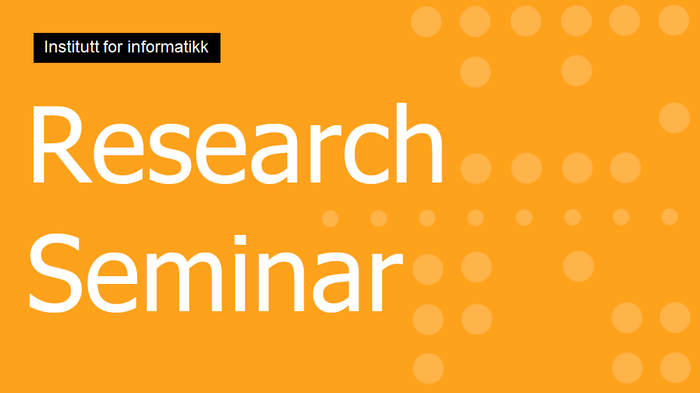dScience events
Upcoming
Registrer now for the PRESIMAL Autumn Research School – AI in Medical Imaging 2025!
Welcome to the annual Data Science Day, where the data science community comes together for a productive mix of networking, learning, and entertainment. This year we ask: what does AI mean for the way organisations and industries work, and how is it transforming our everyday practices? Through emerging trends, real-world use cases, and forward-looking insights, we’ll explore how intelligent systems are reshaping the workplace—driving efficiency, sparking innovation, and redefining the future of work.
Welcome to this week's lunch seminar with August Arnstad and Sigurd Holmsen.
Join this hands-on workshop to learn the essentials of crafting clear, engaging scientific posters.
Welcome to this week's lunch seminar with Marco Palmiotto.
Welcome to this week's lunch seminar with Vilde Hansteen Ung.
Join us in the Science Library on November 13, 2025, from 12:00 PM to 1:15 PM, for a talk by Professor Marianne Fyhn.
Welcome to this week's lunch seminar with Jonathan Goldenberg.
Welcome to this week's lunch seminar with Camilla Hagen Blixhavn.
Previous
Welcome to this week's lunch seminar with Valeriia Liakh.
dScience and Kongsberg Maritime hosts a workshop on AI, data and computing in sensor systems at Lysaker. The event gathers partners from academia, industry, and research to discuss how AI is reshaping sensor technology. This workshop is part of the dScience Partner Program and is by invitation only.
On 12 September 2025, NORA.ai invites you to the next CuttingEdgeAI meeting, dedicated to the practical side of benchmarking in artificial intelligence.
Norwegian Minister of Digitalisation and Public Governance Karianne Tung holds annual lecture on digitalisation status in Norway.
Join us for an insightful seminar on Industrial AI for Safety-Critical Systems, where industry leaders and experts will share the latest advancements, real-world experiences, and key challenges in applying AI in safety-critical domains.
For the first time ever, the prestigious FENS Regional Meeting (FRM 2025) will be held in Norway. The Norwegian Neuroscience Society, in collaboration with the Nordic neuroscience societies, invites you to a major Nordic-European neuroscience conference in Oslo from 16–19 June 2025.
Nitesh Goyal, Google Deepmind, will present a talk titled - Impact of Data Annotator Identity on ML Model Outcomes: Unpacking Specialized Rater Pools.
Goyal will be giving two talks at the Department of informatics this June, with support from the Design4Dem research group (UiO:Democracy), situated within the DESIGN group.
How can machines and humans learn together to improve rehabilitation outcomes? In this seminar, Associate Professor Ulysse C?té-Allard will present cutting-edge research on the use of wearable biosensors and machine learning to create adaptive, intuitive control systems for rehabilitation technologies. Learn how co-learning and self-learning approaches enable these systems to respond dynamically to muscle activity, paving the way for more personalized and effective human-computer interaction in assistive technology.
Join us at the dScience Lunch Seminar where Andreas Carlson, Professor at the Department of Mathematics, will present how fiber geometry can be used to control droplet flow. He will discuss how droplets move on fibers, the flow regimes on twisted fibers, and how these insights can be applied to improve water harvesting with fog nets.
Do you work with sustainability? This seminar is a unique opportunity for you to connect with other researchers at the university.
The PhD special event highlights a diverse spectrum of research topics, ranging from statistical methods for change detection and methane emission analysis using drones, to the role of electric vehicles in renewable energy integration, trustworthy AI through explainability and fairness, and advances in data-constrained language modeling.
Join us at the Science Library on May 8, 2025, from 12:00 PM to 1:15 PM.
How can ethical principles keep pace with rapidly evolving AI in healthcare? In this seminar, PhD researcher Jonathan Adams presents structured methods that combine philosophical foundations with practical tools to guide ethical AI development.
Join us at the Science Library on April 3, where theoretical physicist Morten Hjorth-Jensen explores how Quantum Technology and Artificial Intelligence are shaping the world of tomorrow. Learn how these powerful tools intersect, what they mean for science and society, and where the frontier of innovation is headed.
Discover the Tsetlin Machine, an AI method that learns logical, human-understandable rules while matching neural networks in performance. Led by Prof. Ole-Christoffer Granmo, this seminar covers its fundamentals, applications, and recent advancements.
Open to students and researchers. Free event sponsored by Norwegian AI Cloud (NAIC). Register now!
How can we make sense of messy, limited data in the search for better cancer treatments? In this week’s dScience Lunch Seminar, Professor Manuela Zucknick presents a powerful probabilistic modeling approach that tackles the challenges of small, noisy datasets in high-throughput drug combination screens—paving the way for more precise and reliable predictions in oncology.
How can we integrate complex models with real-world data under uncertainty? At this week’s dScience Lunch Seminar, Berent ?nund Str?mnes Lunde from Equinor will discuss ensemble-based data assimilation, a method used in fields like weather forecasting and subsurface modeling. He will introduce the Ensemble Information Filter (EnIF), an approach that improves statistical efficiency, removes ad-hoc localization, and addresses key challenges in large-scale systems. Join us for a discussion on the future of data assimilation and its applications.

3.png?alt=listing)





















